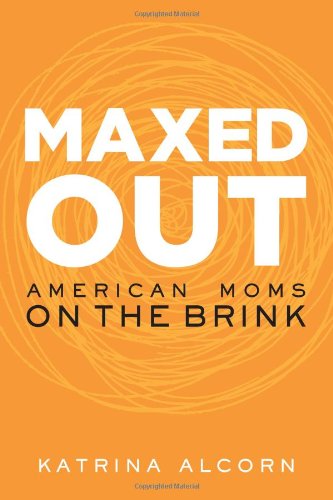It’s no secret that being a working mom is a tough job, and everyone seems to have an opinion on the downsides. When many working mothers hear, “you can have it all,” they also hear, “and since you don’t have it all you must be doing something wrong.” We want to honor Shana, at the beginning of her parental journey, for sharing with us the story of Katrina, who bravely shared what happens when those messages are just too much. ~ InPower Editors
In Maxed Out: American Moms on the Brink, Katrina Alcorn documents her downward spiral into physical, mental and emotional exhaustion as she tried to achieve the elusive American dream of “having it all”, that is, successfully balancing a demanding career and a family.
In March 2009, Alcorn experienced a panic attack on the side of the road and realized enough was enough. Working full-time while trying to be the mom she wanted to be had become too much. Something had to give. She quit her job and took a year off to regroup. She took an entire year off, because the few weeks, then a few months off just wasn’t enough to recover from the full and total breakdown she had experienced after years of pushing herself too hard.
As a new mother to an 8 month old, I read Alcorn’s story with a mix of fascination and horror. Was this what I had to look forward to? Like Alcorn, I’ve had the luxury to spend the first few months of my daughter’s life working from home and making my own schedule around storytime, music classes and trips to the park. But all the while, I have been open to returning to the workforce full time and reading this book put words to many of the thoughts and fears that have gone through my head.
Moms on the Brink
While Alcorn’s story is compelling, it’s the research sprinkled throughout her book that hammers home the fact that women are being forced to choose between career and family in the United States. Inflexible workplaces, unpaid maternity and sick days, an overemphasis on “face time” in the office puts a strain on mothers.
In the current economic climate, many women don’t have the option to not work, even when much of their paycheck goes towards child care. And those who want to advance their careers often find themselves boxed out and placed on the mommy track with little room for growth, because they had to leave early to pick up a sick child or they wouldn’t stay late because they didn’t want to miss bedtime.
What Can We Do?
Alcorn describes what needs to change. First, women need to learn to say no, whether to another demanding project at work or baking for a school fundraiser. We need to communicate what we’re experiencing more effecitvely and seek out help when we need it, whether from our employers, our partners or from family and friends. We need to support other women rather than passing judgment and making assumptions. And, a point that stood out to me, we need to stop apologizing for taking care of ourselves and our families. No one should have to apologize for leaving at 5pm after working a full eight hours.
We also need to change the culture of the workplace. Some of that change can happen from the ground up, by encouraging employers to allow flexible schedules and telecommuting. Rather than counting hours logged in the office, employers can focus on the results achieved wherever and whenever the work got done.
And we need to get Washington involved. The United States is the only developed nation that does not offer paid maternity leave. We need to lobby Congress to pass legislation so women are not punished for having a child and are allowed to take the time to learn how to be mothers before heading back to work. We need to get more women into Congress, which means supporting women on the ballot, to make sure we have a voice in our government.
Are You Maxed Out?
As I read Alcorn’s story, I kept thinking to myself, ‘this won’t happen to me.’ I’m not like her. I know when to say no, where to draw the line, when to just go home. But ultimately, that’s the point. Alcorn is just like a lot of women out there. Unlike Marissa Mayer, who brought her baby to work, or Sheryl Sandberg, who says we just need to “lean in” more, Alcorn is a a regular woman who was trying to make it work. Her story shows how easy it is to get in too deep and how hard it can be to claw yourself back out.
Ultimately, Maxed Out is a cautionary tale. Alcorn shows us what a nervous breakdown looks like and the path that took her there is a common one. Many of us may be on the verge, but few are brave enough to admit it.
Do you believe you can have it all?
Check out the resources in the InPower Coaching EQ at Work and Soft Skills Research Index.







